You know the blockchain, now it’s time to understand the DCEP central bank digital currency.
BlockBeats Note: The description of DCEP in this article is based on the comments and articles currently published by public or public channels, and is for research purposes only. The specific details of DCEP are subject to the official announcement of the central bank.
BlockBeats has reported that at the US Congressional hearing on Facebook's crypto-stabilized currency Libra on October 24th, Facebook CEO Mark Zuckerberg's testimony said that China is about to launch digital currency in a few months. This was one of the most important arguments that Zuckerberg defended Libra at the time. Sure enough, in less than a week, China gave the answer.
Following the opening of the speech on October 25th, “Taking the blockchain as an important breakthrough for independent innovation in core technologies”, Huang Qifan, vice chairman of the China International Economic Exchange Center, once again became the focus of discussions at the domestic and international blockchain industry: People's Bank of China Probably the world's first central bank to introduce digital currency.
This is the first time in the world to understand the full picture of the central bank digital currency DCEP.
- MakerDAO CEO: DeFi market still has these shortcomings
- Why is the promulgation of the cryptography method a tool to promote the blockchain?
- QKL123 market analysis | risk aversion has eased; Britain's Brexit twists and turns (1029)
But the central bank is not trying to compete with Libra, but the long-term plan of the central bank.
According to the public information compiled by BlockBeats, in 2014, the central bank has begun to propose research on digital currency. Three years later, the Central Bank Digital Currency Research Institute was established. Until October 28, 2019, the central bank's digital currency DCEP was formally proposed. 74 patents have been applied for digital currency. For the digital currency, the central bank is clearly prepared.
So what exactly does DCEP look like?
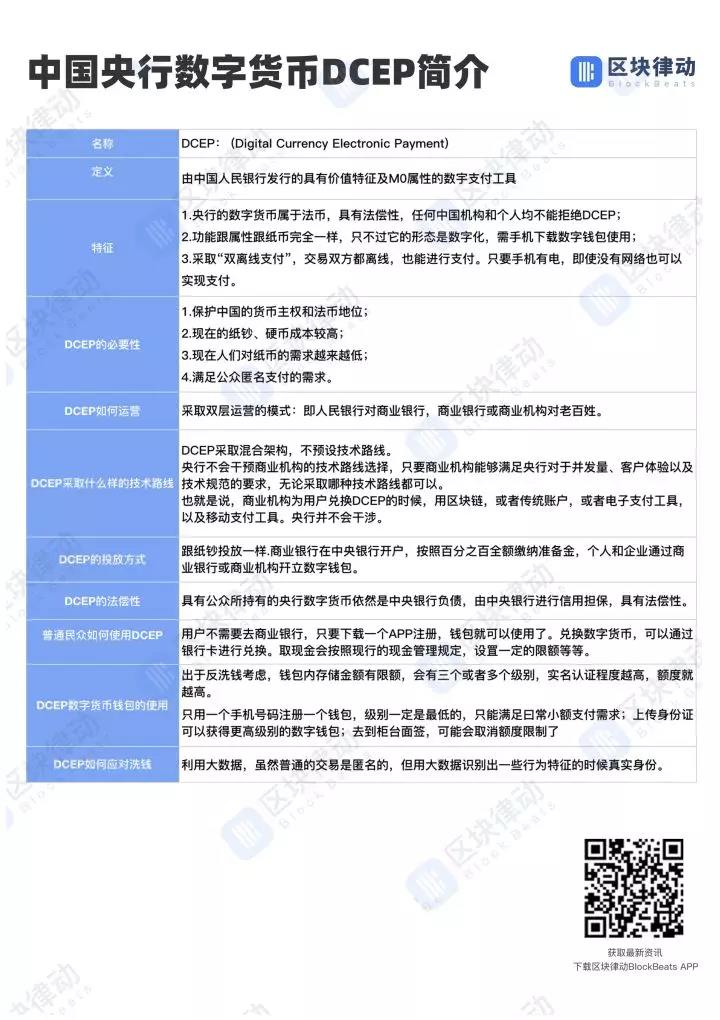
DCEP (Digital Currency Electronic Payment) is a new encrypted electronic money system based on blockchain technology. It will replace M0 (RMB circulation) and has the same function as banknotes. Any China Organizations and individuals cannot refuse to receive DCEP. At the same time, DCEP adopts “double offline payment”, both sides of the transaction are offline, even in underground shopping malls without signals, transactions can occur.
For the management of DCEP, the central bank will adopt the “two-tier operation” model: individuals and enterprises open digital wallets through commercial banks or commercial organizations. Just like cash now, users can exchange DCEP on mobile APPs through bank cards. The central bank mainly manages commercial banks and is not directly oriented to users.
For the technical route choices of commercial banks and commercial organizations in the face of mass exchange, the central bank does not interfere, according to block block rhythm understanding of BlockBeats, as long as the commercial organization can meet and meet the concurrency, user experience, and technical specifications, commercial organizations When sending DCEP to users, you can choose blockchain technology, or traditional account system, and other payment tools, the central bank will not intervene.
The full picture of DCEP has been glimpsed. Obviously, China will digitize and internationalize the RMB through DCEP. What is the difference and impact between DCEP and Libra, Bitcoin, and domestic payment giant Alipay and WeChat payment?
Comparison with Facebook Libra Stabilizer
Libra is an encryption-stable currency launched by Facebook, and hopes to open up global commercial payment scenarios. For decentralization and better credibility, the Libra Association was originally composed of 28 founding members, most of which were leading American companies. However, due to regulatory pressures, seven founding members such as paying giant PayPal have withdrawn from the Libra Association. There are only 21 members.
Architecturally, Libra and DCEP are many different.
Libra is issued by the Libra Association node, not issued by the Federal Reserve, and is not currently licensed by US regulators. Moreover, Libra's value is supported by the reserves of legal currency assets and high-credit government bonds (ie, a basket of currencies), but 50% of the documents currently disclosed will be US dollars. In addition, users who use Libra in their wallets need KYC (identity authentication), while DCEP will be managed according to the real name.
BlockBeats believes that at this level, DCEP is more like the “digital renminbi” issued and settled by the People's Bank of China. It is legal. Individuals and merchants in China must accept DCEP payments, and also allow dual offline payments. DCEP borrows. The blockchain architecture is not all used. Libra is a digital currency system that needs to be traded in a network environment. It is distributed and settled by Libra nodes, but it can only be used in Libra wallet and its ecosystem. It is not legal. Libra is essentially a coalition chain framework. The stable currency underneath.
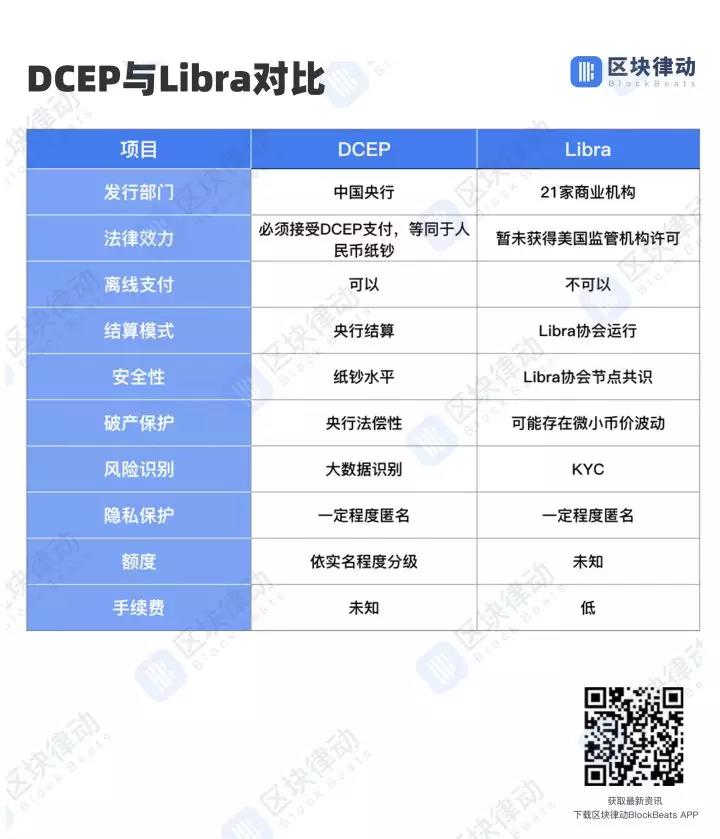
Comparison with cryptocurrencies such as Bitcoin
So, what is the difference between DCEP and Bitcoin?
First, the properties of DCEP and Bitcoin are different. DCEP is a solid legal currency, but it is presented in digital form by means of a blockchain. Bitcoin is a commodity or alternative asset. Deflation is doomed to be unsuitable for currency, and bitcoin's payment function has been limited so far. The broader application scenario is value storage (digital gold) and speculation.
BlockBeats believes that the difference in attributes determines the difference between DCEP and Bitcoin in terms of currency value, issuance, settlement, and privacy protection. DCEP is issued and settled by the People's Bank of China. It is stable and legal. Bitcoin is not issued by any central bank or institution. It is generated by the algorithm according to specific mining rules. Bitcoin is not recognized in most parts of the world. Bitcoin exchange is not allowed. Forex, and prices fluctuate drastically.
The security of DCEP is guaranteed by the central bank technology, at least above the level of banknotes. Since the blockchain technology is not completely copied, there is no problem of centralization of the block nodes in the blockchain, and bitcoin needs full network computing power. Maintenance, to withstand the risk of 51 attacks and forks, and the emergence of ASIC mining machines has made bitcoin's mining power more and more centralized.
In terms of privacy protection, DCEP will categorize the open transaction quota according to the real name. The low degree of certification can be a small transaction, the degree of high certification is relaxed, and the hierarchical management achieves a certain degree of anonymity, which maximizes the privacy of ordinary users. At the same time, however, central financial institutions have the need and need to combat money laundering and criminal activities, so they use big data to analyze, identify, and detect illegal behavior in DCEP. While Bitcoin can't be traced directly to individuals on the Internet, as long as the contact between the currency address and the user is exposed, people with ulterior motives can track it in the blockchain.
On the other hand, Bitcoin does not satisfy the interchangeability of money. Each BTC is different due to different transaction records. The BTC with criminal history related transaction history is not popular. Virgin Bitcoin has appeared in the West. The statement of the virgin coin. By definition, Bitcoin does not have true anonymity, only has the pseudonym of the transaction. DCEP's hierarchical and accountable anonymity not only truly conforms to currency interchangeability, but also digitizes the banknotes. The most important thing is DCEP's privacy protection mechanism seems to be the most suitable for real-life situations in BlockBeats – protecting the privacy of ordinary users and combating money laundering.
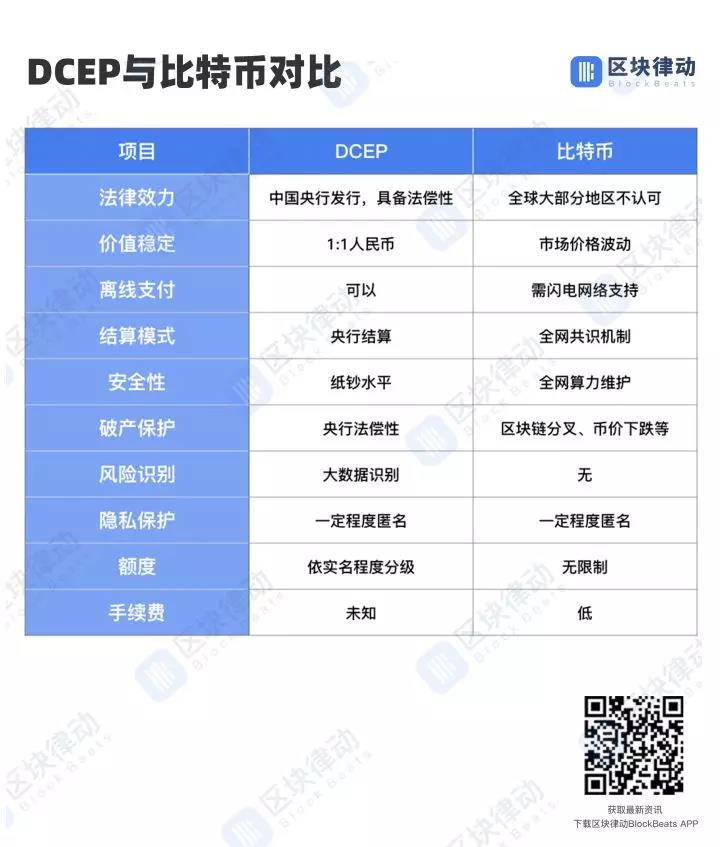
Compared with Alipay and WeChat payment
At the Libra hearing, Zuckerberg specifically mentioned Alipay and WeChat payment. In a sense, Libra's release is to compete with Alipay and WeChat payment.
What impact will the launch of DCEP have on Alipay and WeChat payment?
To put it simply, DCEP is a digital renminbi cash that is settled by the central bank and is legally compensated. DCEP payments are the first layer of direct payment.
Alipay and WeChat payment are a kind of third-party payment method, which is settled by the commercial bank's storage currency. There is a very small probability of bankruptcy risk, and there is no legal liability. Therefore, users may not support Alipay or WeChat payment. DCEP can also achieve offline payment with higher security and quota than Alipay and WeChat.
Block Rhythm BlockBeats wants to describe in a blockchain language, DCEP is the first layer of the underlying architecture, Alipay and WeChat payment will become the second layer of applications.
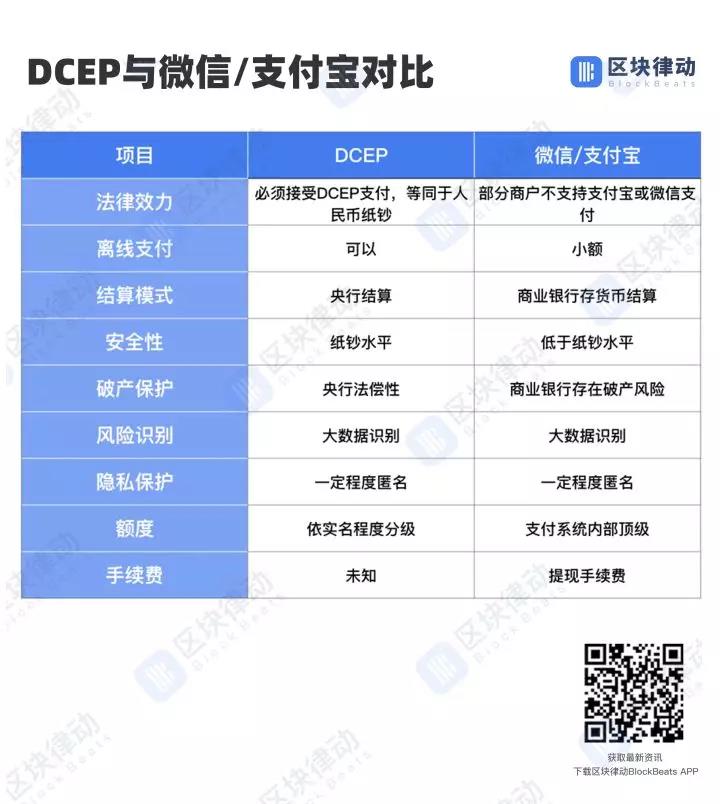
What impact does DCEP have on these third-party payment platforms?
In the block rhythm of BlockBeats, DCEP is more like a stripping function of the third-party payment platform, becoming a separate digital wallet. On October 29th, a screenshot of the ICBC digital wallet flowed out. The picture shows that the ICBC digital currency wallet is the carrier of legal tender and is a payment instrument relying on the legal digital currency circulation system. It is reported that the "ICBC Digital Money Wallet" is an internal testing product for ICBC's water testing related services. Currently, it is only tested in Beijing, Guangzhou and other regions.
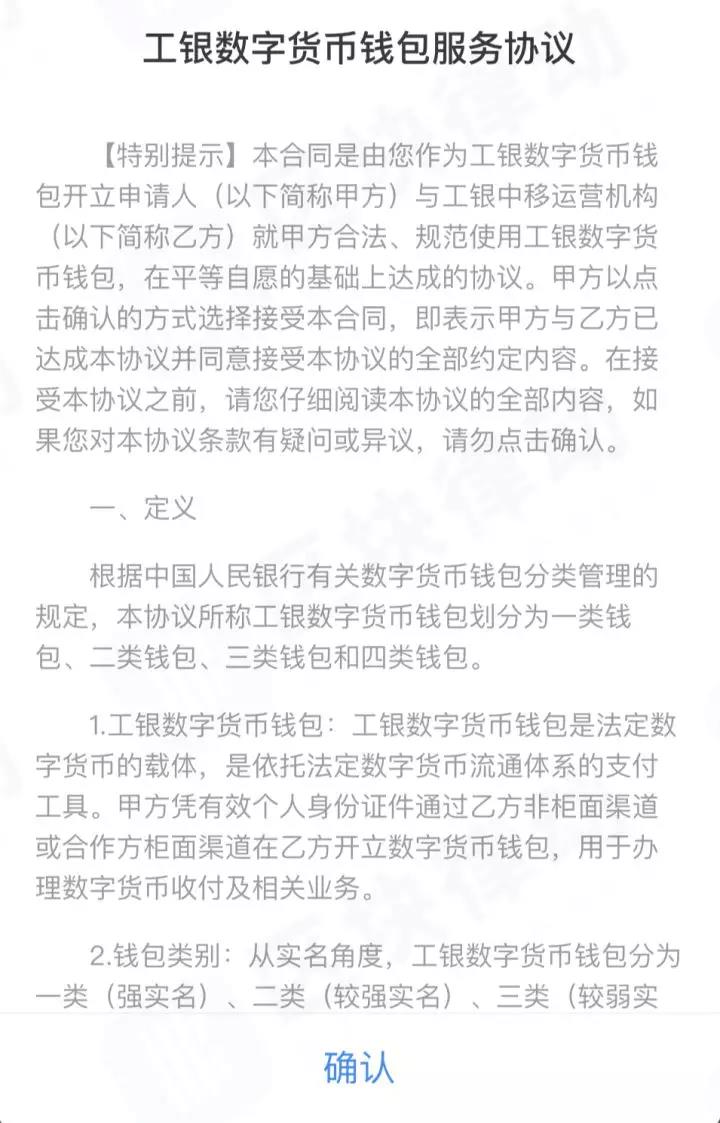
According to the details disclosed at present, ordinary users are faced with commercial banks and commercial organizations. For users, what needs to be done is to download a wallet APP on the mobile phone. Equivalent to converting a former physical wallet into a digital one. However, there is no disclosure about whether the wallet has other application ecology. The ecology of Alipay and WeChat payment has been fully established and is becoming more and more perfect. The launch of DCEP will not affect the application ecosystem of third-party payment platforms, and may even make the application ecosystem more complete.
I believe that more information about DCEP will be released soon, and more and more applications related to DCEP will be available. For blockchain technology innovation, we must support it, but also beware of possible risks. According to the block rhythm BlockBeats observation, there are already some altcoin exchanges that have started trading DCEP tokens, and some communities have also started private investment in fake DCEP. Industry participants and ordinary users are advised to be deceived. All information is subject to the official announcement of the central bank.
We will continue to update Blocking; if you have any questions or suggestions, please contact us!
Was this article helpful?
93 out of 132 found this helpful
Related articles
- Hide the big plan to revive the sterling pound and uncover the mystery of the Bank of England’s digital currency plan
- Science | What is the blockchain?
- Xiao Ge’s whimsy only used bitcoin to travel to Europe. In the first 40 hours, he didn’t like it…
- "I must come back to save this company!" Wu Jihan "forced the palace" to regain the position of the mainland
- A total of the wind! Babbitt goes online "Industry blockchain channel"
- Viewpoint | The essence of blockchain is a variety of data governance ideas
- Countdown to 10 days, grab the ticket Raiders! World Blockchain Conference · Wuzhen is worse for you






